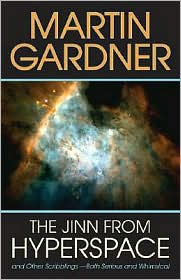Prometheus Books, ISBN-10: 1591025656

Another Gardner book is always good news, for both skeptics and aficionados of science and mathematics. Over the last fifty years, he has written nearly a hundred books, especially about mathematical puzzles and diversions. This latest volume is a collection covering a range of his own enthusiasms, which yields a slightly odd assortment in this case.
As he says himself in the Preface, he “may be the only non- Catholic admirer of Gilbert Chesterton”, and it is indeed fairly unlikely that readers of this journal would be committed readers of G. K. Chesterton’s detective fiction. In the section devoted to this writer, Gardner writes, “I’m well aware of his few faults – his unconscious anti-Semitism, his ignorance of science, his naïve political views – but I share his faith in a personal God”. For this reviewer Gardner’s theism is as baffling as some of his famous mathematical puzzles, but it has been pointed out before that if anyone with a scientific background might be susceptible to religious belief, those from the physical sciences are more prone than those trained in biology. Gardner is greatly interested in the controversies about super-strings and twistors in theoretical physics, and in reviews of books by Roger Penrose he pursues the question of the mind, reporting approvingly that Penrose’s “little finger tells him that the human mind is more than just a collection of tiny wires and switches”.
There may be few wires in the human head, but switches and connectors abound, and they got there through natural selection, like all the other systems and components that make life possible. This process is, of course, awe-inspiring but it is also non-teleological, and it is disappointing that Gardner has never managed to realize just how dangerous, as Dennett puts it, Darwin’s idea actually is for the theistic outlook.
A typographical error in the chapter on false memory may offer a new word for a belief that is, as Wolfgang Pauli is quoted as saying later in the book, “not even wrong”: hyponotism.
Gardner’s reviews and articles on mathematics and physics are interesting enough, although there is a fair amount of repetition involved across the various texts. He defends a kind of Platonism in mathematics: the structures and theorems of mathematics are objectively real, rather than merely cultural constructions. “Penrose finds it incomprehensible (as do I) that anyone could suppose that [the Mandelbrot set] is not as much ‘out there’ as Mount Everest is, subject to exploration in the way a jungle is explored.”
The first section, Science, Math, and Baloney, begins with an article about the False Memory Wars, and goes on to include mathematical fiction: short stories such as The Jinn from Hyperspace. The section on literature, mostly concerning Chesterton, ends, unusually with an early attempt at free verse, So Long Old Girl, an elegy for a decommissioned warship that Gardner had served on. This is reminiscent of some of Buckminster Fuller’s poetry on industrial/technological themes, but is, unfortunately, quite unseaworthy. Gardner wisely admits as much: “I am not much of a poet”.
He is an enormously engaging writer, though, and pays tribute to two other writers in the final sections of the book. Part Three concerns L. Frank Baum, the author of The Wizard of Oz, and the book ends with a collection of five introductions to books by Lewis Carroll. Gardner’s closing sentence can be applied to his own work: “If you are not yet acquainted with Alice’s adventures in Wonderland and behind the mirror, read on and enjoy!”
Paul Taylor



